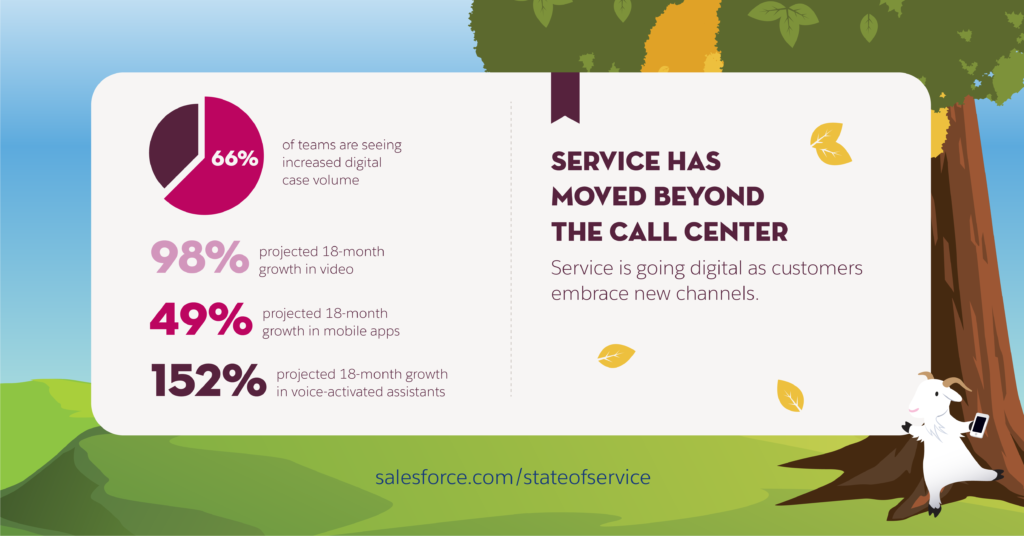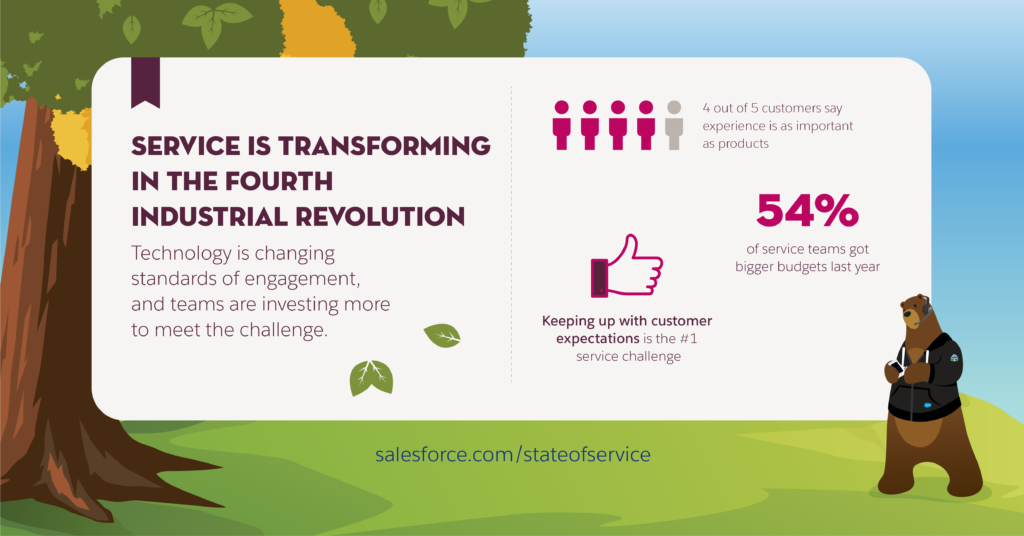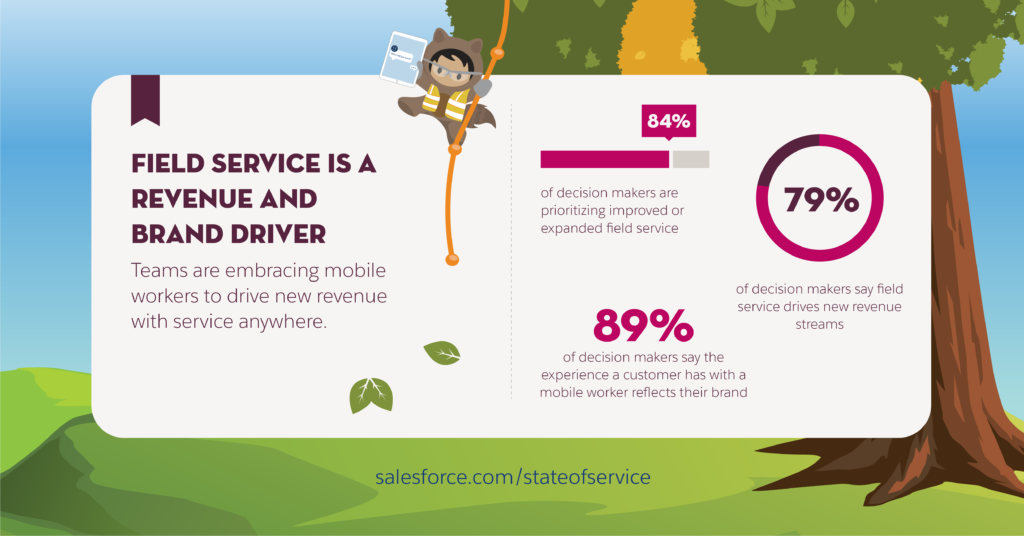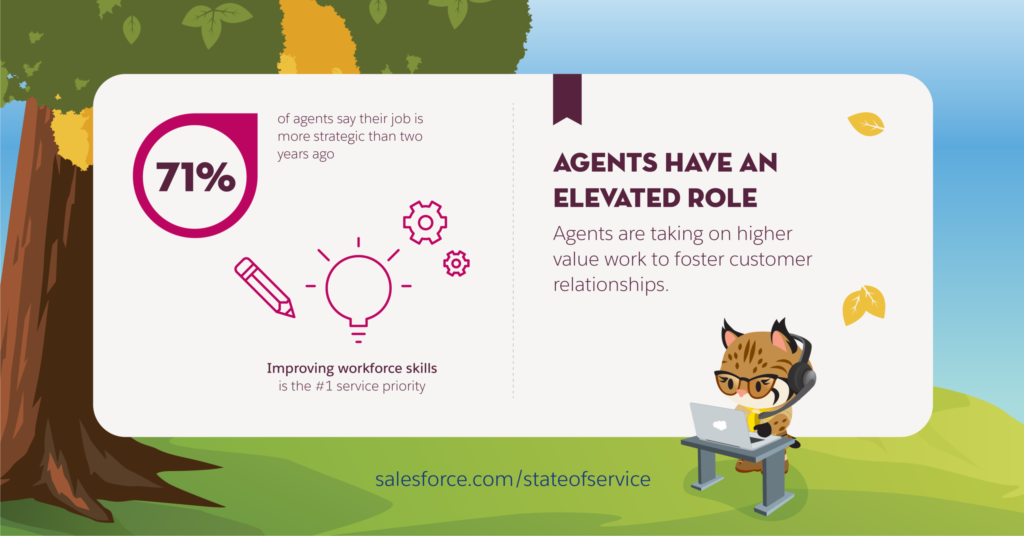Salesforce is the fast-growing, always changing, cloud based platform that started as a CRM and today includes Commerce Cloud, Sales Cloud, Service Cloud, Data Cloud, Marketing Cloud, Community Cloud, Analytics Cloud, App Cloud, and through Salesforce.org, Non-Profit Cloud, Education Cloud, and Philanthropy Cloud.
In addition to product design, development, and customer support, Salesforce invests in wide-ranging research, always scanning the world to report what’s happening, what’s changing, and what’s coming up in the future.
This report, the 2019 edition of the “State of Service” includes results from a survey that reached more than 3,500 service leaders and agents worldwide.
The insights from this report are key: Today’s customer expects more than before, and quicker than ever before. The tools exist to for companies to serve customer better.
But only the leading companies are unifying their technology and inspiring their teams to implement and capture the benefits of what’s possible today. Let’s take a closer look.

1. Keeping up with the customer is the #1 service challenge.
This makes total sense, because the customer you serve is also being served by many other organizations; commercial, social, medical, financial, retail, recreation, government, and more.
This is happening in-person, online, over the phone, through apps, face-to-face, at work and at home. And this level of service expectation is “turned on” 7 days a week, 24 hours a day, every day of the year.
When service improves in one area, expectations climb in all the others. When your online shopping is smooth and easy, you expect everything online to be smooth and easy. If you have one great experience with a service agent or call center, you expect every call center and service agent to serve you just as well.
This not going to change. Keeping up with the customer also means keeping up with the competition, and with the latest in the technology, the standards, and the practices of delivering great service.

2. 4 out of 5 customers now say the experience they have is just as important as the products they buy.
The only surprise here is that it’s not already 5 out of 5. Products don’t exist in isolation any more. In fact, the products are just one important part of the overall experience a company delivers.
That experience includes marketing so customers learn about the product, sales so customers choose and buy the right product, smooth and timely delivery of products, support for customers to learn more about their products, and troubleshooting, replacement or repair if something goes wrong.
Experience is how companies build brands, differentiate from competition, and create more loyal customers. It’s no longer true that a better mousetrap will bring more customers to your door. Today, it’s better experience that brings new customers to your door, and keeps happy customers inside your doors.

3. 79% of decision makers say field service drives new revenue streams.
In the old days, field service was the place for repairs, spare parts, maintenance, and warranties. It was like a caboose at the end of the linear train: product development, marketing, sales, delivery, and then field service, but only needed if something goes wrong.
Today, the value train is continuous and not just linear from start to finish. One purchase leads naturally to upgrades, add-ons, loyalty status, subscription revenue and automatic renewals.
In this new world, it’s your field service agents who know the customer, and understand the customer. And these field service agents are in the best position to make trusted recommendations to the customer. This is an incredibly powerful and profitable position.
But it must be supported by instant access to the latest information, easy access to specialist support, AI generated insights and recommendations. When Field Service agents are equipped with an integrated, mobile, always-on service platform, then your old caboose can become a brand new engine for customer loyalty and more sales.

4. 71% of agents say their work is more strategic than two years ago.
Service agents know they are more important to their companies than ever before. They want better and faster tools. They expect better support. And they will move if they must to join a company that values their role in taking good care of customers, which means taking good care of the business.
The problem is that not every company is getting this essential message. Only 69% of service agents say they have all the tools and technology they need to do their job. And that is a huge issue for everyone to understand. Because companies that leave service behind, are going to fall behind.
Get your complimentary copy of the Salesforce “State of Service” report by clicking on this link.
Share the details and share this video with everyone who needs to understand. A company that leaves service behind, falls behind. While companies that invest in service will create a future that is better and stronger for everyone.



